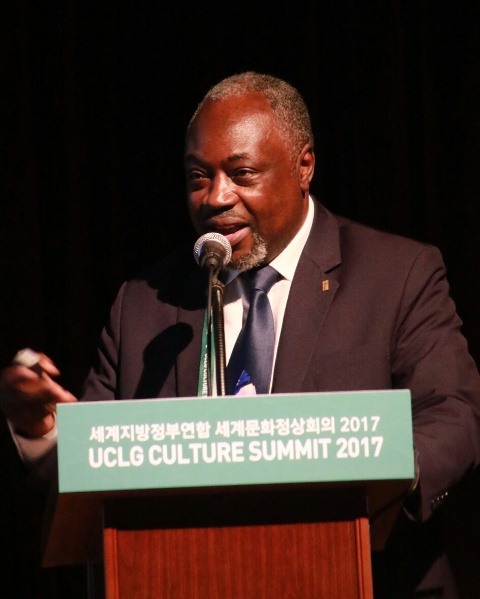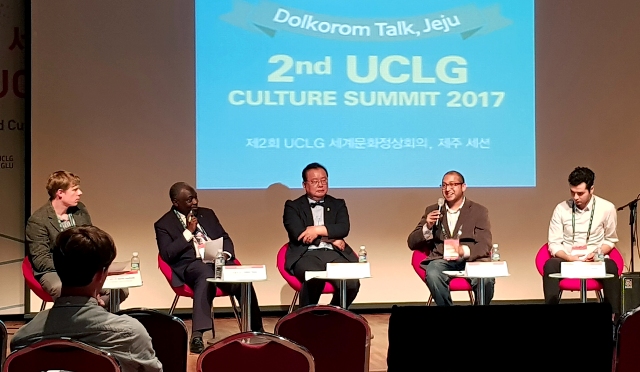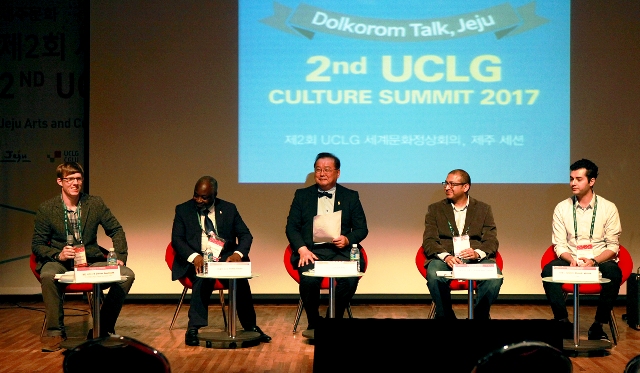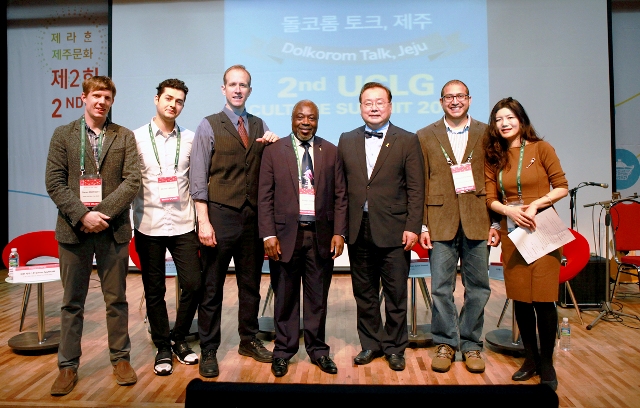| |
 |
|
| ▲ Yiombi Thona Photo courtesy Oh Joon-seok |
Professor Yiombi Thona joked that since he speaks Congo English (Conglish), Koreans who speak Konglish understand him perfectly.
Everyone in the small but diverse audience laughed and then put on wireless headsets for real-time translation during this UCLG 2nd Culture Summit event.
Born into the royal family, educated abroad, and a member of the Democratic Republic of the Congo’s (DRC) intelligence community for eight years, Yiombi was accused of an attempted coup d'état when he voiced concerns about a government deal with a rebel army.
He and several other members of the intelligence corps suddenly found themselves incarcerated. After six months of deprivation and torture they were released, but they knew they weren’t safe.
Later on, Yiombi found out that a couple of his peers secured passage to France where they received refugee status after three months. Another made it to England where his skills in intelligence were recognized, and both a job and citizenship were extended to him.
Yiombi had a very different experience. He spent a month in a safe house waiting for his window of escape. When it finally came, it was in the form of a fake passport to China.
Unfortunately, it was only a momentary respite. China’s ties with the DRC are strong so Yiombi spent a week in Beijing feverishly searching for asylum. He reached out to several other countries in Asia but he couldn’t secure a visa.
Finally, to his intense relief, his application was accepted to Korea. He was on the next available ferry.
It was 2002, and Yiombi didn’t even really know where he was going. He knew nothing about Korea - only bits and pieces from a few media reports about the North.
“Pyongyang is such a large city,” he thought to himself as he took a taxi from Incheon to a hotel near Seoul Station.
Yiombi’s arrival in Korea would usually represent this story’s denouement - where the narrative of his harrowing escape from the Congo reaches a satisfactory resolution.
Unfortunately, it was just the beginning of a grim and challenging six year period where he was forced to continue fighting for his life, this time caught in the gears of Korea’s bureaucratic machinery.
You see, even though Korea signed the U.N. Refugee Convention in 1992, the Korean governmental apparatus - like far too many national administrations - isn’t really set up to process refugees.
The Republic of Korea began receiving applications in 1994, and it wasn’t until 7 years later that it recognized its first refugee, in 2001.
According to the Korea Times, “from 1994 until March 2016, Korea has only recognized 588 refugees, while receiving 16,979 applications during the same period.”
Far more humanitarian visas have been granted, however, these meager allowances provide next to nothing for successful applicants - even when they aren’t detained at the airport first.
According to a CNN report, as of 2016 over 100 refugees had been kept in a "repatriation waiting room" meant for no more than 50. Some, including Syrian refugees, waited in these cramped conditions for as long as six months.
Incidentally, that same report went on to explain that as of September 2015 there were 848 Syrian asylum seekers in South Korea, of which only 3 had been given refugee status; 668 were in the country on humanitarian visas.
Humanitarian visas in Korea are predicated on the assumption that applicants will leave as soon as they are able. However, given the fact that these visas don’t allow applicants to legally work, it’s a dire Catch-22 for people who are already in desperate circumstances.
People like Yiombi Thona.
Imagine arriving in a foreign country. You don’t know the culture or the language. You’ve lost everything and you’re on the run - you have almost no money, no friends, no contacts. You get a temporary visa and then you are expected to somehow to survive with no job, nowhere to stay, and no official support.
The terror inspired by such bureaucratic indifference is almost beyond comprehension, especially since, as Yiombi correctly pointed out, the first few Korean presidents were themselves refugees of the Korean War.
Despite his easy and entertaining stage presence, the details of his struggle left the audience quietly contemplating such immense hardship. It was a challenging presentation that the event’s three guest panelists expanded upon.
| |
 |
|
| ▲ Prem Turimani with the microphone Photo courtesy The Jeju Weekly |
Professor Chu Chin-oh from Sangmyung University spoke at length about the Japanese origins of Korea’s racial nationalism.
Ideas about racial purity and national identity that once helped Korea rally against Japanese occupation are now hindering modern efforts to foster increased diversity - from issues of asylum seekers to integrating the ever-growing population of immigrants and expatriates living in the country.
A vestige of the late 18th century, the limitations of anachronistic “pureblood” beliefs were being highlighted by the rapid changes of 21st century Korea, especially now, during a pivot point in the evolution of Korea’s national, economic, and global identities.
“Inside an apparently grown person, Korea is filled with young organs. We still have no real experience with being a dominant majority within our own culture,” Professor Chu offered.
Professor Chu went on to suggest that perhaps “intercultural” was a superior way of describing societal goals since merely having multiple ethnic groups living within one country was less desirable than having a deep exchange of ideas and norms among those groups to forge a wholly new cultural confederation.
The next speaker, Prem Kumar Tirumani, is originally from India. He began by describing his repeated attempts to learn Korean at a multicultural center in Jeju. After four years he still wasn’t been able to move past the basic structure of the courses because they are aimed specifically at East Asian wives married to Korean men.
“There’s an emotional barrier at work since these governmental projects focus on a very narrowly defined segment of the population - to the exclusion of everyone else,” Prem said.
He also talked about the intense frustration of applying for a visa. His application was met with a troubling resistance - requests for additional paperwork that never seemed to be the right documents.
Prem, married to a Korean national, described how he had to openly lose his temper before they were finally ready to accept that he had fulfilled all of the official requirements.
Finally, Ahmed Lababidi described his experiences as a Syrian seeking refuge in Korea, and the many obstacles he continues to face living on a 3-month renewable visa.
After five years in Korea, Ahmed was recently tasked with renewing his Syrian passport which would have meant providing a government in the midst of a bloody civil war with his contact details. Korean Immigration demanded that he do so, but he feared possible repercussions.
Now, he is in an uncertain legal stalemate with Korean Immigration that leaves his future in Korea in question, despite the fact that this is now very much his home.
Ahmed’s difficulties brought the session back to a point Yiombi had made near the start of the talk. There is a disconnection between official policies and the practical application of refugee rights and the integration of foreign nationals into Korean culture.
“Non-Koreans exist outside the civic imagination of mainstream Korea,” Yiombi said, “People need the right information about refugees and foreigners, but the government, education, media, and charities are all perpetuating deeply flawed stereotypes.”
It’s a misrepresentation that also extends to South Korea. Professor Chu explained that the world tends to view Korea through the lens of the North rather than making a distinction between the two.
“Exactly,” Yiombi responded, “How many countries are there in Africa? In the end, no matter what happens in an individual country, they are are all lumped together as if one culture were the same as 54 others.”
| |
 |
|
| ▲ Closing statements Photo courtesy The Jeju Weekly |
Moderator Darren Southcott skillfully responded to all of these emotional hot button topics with economy and skill, helping to maintain the honesty and integrity of discussing these issues without allowing the dialogue to descend into an angry indictment of Korean culture.
“Proper education is essential,” Darren said in summary, “but we must stand up for our individual rights as well. A political solution by itself is not enough to realize these necessary changes.”
As the third and finally UCLG session of the day came to a close, musical guests Omar and Tehiun brought their creative spark to this subject, so near to the heart of the UCLG’s global initiative to champion culture and community as a force for social and individual wellbeing.
The Jeju Weekly was privileged to be able to host this session as part of its ongoing Dolkorom Talk series, curating local community interaction and growth through art and information.
We hope that we can draw upon the connections made today to develop practical solutions in the near future to the issues that divide us from the fullness of our communal strength.
We look forward to working together again in the next Dolkorom Talk, to deconstruct the idea that people must be absorbed into a dominant culture, assimilated and stripped of the wealth of diversity that might otherwise be cultivated through a more integral embrace.
| |
 |
|
| ▲ Speakers and staff at the event Photo courtesy The Jeju Weekly |
|























